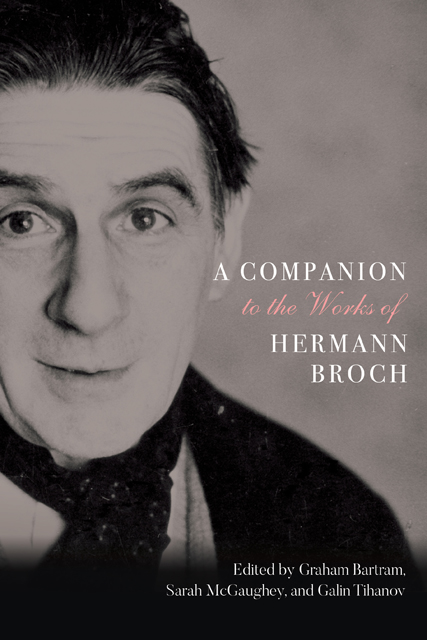Book contents
- Frontmatter
- Contents
- Preface
- Acknowledgments
- List of Abbreviations
- Introduction: Broch’s Life and Works
- 1 Perspectives on Broch’s Die Schlafwandler: Narratives of History and the Self
- 2 Hermann Broch and the Dilemma of Literature in the Modern Age
- 3 Interrogating Modernity: Hermann Broch’s Postromanticism
- 4 Broch and the Theater: Die Entsühnung and Aus der Luft gegriffen as Tragic and Comic Dramatizations of the Economic Machine
- 5 Limits of the Scientific: Broch’s Die Unbekannte Größe
- 6 Broch’s Die Verzauberung: Ludwig Klages and the Bourgeois Mitläufer
- 7 Hermann Broch’s Massenwahnprojekt and Its Relevance for Our Times
- 8 Human Rights and the Intellectual’s Ethical Duty: Broch’s Political Writings
- 9 Broch’s Der Tod des Vergil: Art and Power, Language and the Ineffable
- 10 From the “Tierkreis-Erzählungen” to Die Schuldlosen: The Creation of Broch’s Last Novel
- 11 Broch’s Legacy and Resonance
- Selected Bibliography
- Notes on the Contributors
- Index
4 - Broch and the Theater: Die Entsühnung and Aus der Luft gegriffen as Tragic and Comic Dramatizations of the Economic Machine
Published online by Cambridge University Press: 20 January 2023
- Frontmatter
- Contents
- Preface
- Acknowledgments
- List of Abbreviations
- Introduction: Broch’s Life and Works
- 1 Perspectives on Broch’s Die Schlafwandler: Narratives of History and the Self
- 2 Hermann Broch and the Dilemma of Literature in the Modern Age
- 3 Interrogating Modernity: Hermann Broch’s Postromanticism
- 4 Broch and the Theater: Die Entsühnung and Aus der Luft gegriffen as Tragic and Comic Dramatizations of the Economic Machine
- 5 Limits of the Scientific: Broch’s Die Unbekannte Größe
- 6 Broch’s Die Verzauberung: Ludwig Klages and the Bourgeois Mitläufer
- 7 Hermann Broch’s Massenwahnprojekt and Its Relevance for Our Times
- 8 Human Rights and the Intellectual’s Ethical Duty: Broch’s Political Writings
- 9 Broch’s Der Tod des Vergil: Art and Power, Language and the Ineffable
- 10 From the “Tierkreis-Erzählungen” to Die Schuldlosen: The Creation of Broch’s Last Novel
- 11 Broch’s Legacy and Resonance
- Selected Bibliography
- Notes on the Contributors
- Index
Summary
Consisting of only three plays, Broch’s dramatic work plays a modest role within the author’s oeuvre and has long been overlooked by scholars and theater practitioners alike. While the 1932 tragedy Die Entsühnung was produced once during the author’s lifetime, the 1934 comedy Aus der Luft gegriffen did not make it to the stage until decades after Broch’s death, and Es bleibt alles beim Alten (Everything Stays the Same), a farce Broch wrote in 1934 in cooperation with his son, is still awaiting its theatrical premiere as of this writing (2018). Yet in spite of the fact that these plays have never received the kind of recognition that contemporaries and later readers have bestowed upon Broch’s novels, the growing interest in the twenty-first century in Broch as a dramatist is not surprising. Not only do his dramatic texts serve as rich historical documents that capture the climate of crisis constitutive of the final years of the Weimar Republic, but they also mark a transitional period in the development of German-language theater in which attempts to rethink the function of theater inspired a range of formal innovations. Finally, the plays’ focus on the ways in which an anonymous and increasingly uncontrollable capitalist system affects human relationships and relates to moral decline seems highly relevant when viewed under the lens of early twenty-first-century economic recessions and growing concerns about the risks of globalized market mechanisms, as well as the social ramifications of capitalism’s systemic imbalances.
On 25 November 1932, between finishing the third draft of his first play, Die Entsühnung, and starting the revisions for the final version of the manuscript to be used on the stage, Broch, in a letter to his friend Daisy Brody, expressed some concerns about the direction his work was taking. Like so many who were affected by the economic crisis following the stock market crash of 1929, Broch struggled financially and worried that the unconventional aesthetic methods he pursued in Die Schlafwandler and Die Entsühnung might estrange his audience and make his work less profitable. Nonetheless, he insists on the importance of formal innovation for the advancement of thought: “Dichten heißt, Erkenntnis durch die Form gewinnen wollen, und neue Erkenntnis kann nur durch neue Form geschöpft werden” (KW 13/1, 223; Writing literature means wanting to obtain knowledge through form, and new knowledge can only be generated through new form).
- Type
- Chapter
- Information
- A Companion to the Works of Hermann Broch , pp. 91 - 107Publisher: Boydell & BrewerPrint publication year: 2019



